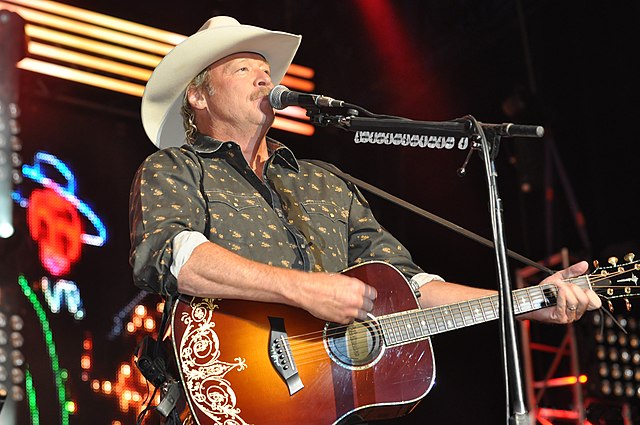Blog Post
The Country Music Culture War
And he bowedHis head to JesusAnd he stoodFor Uncle SamAnd he only lovedOne womanHe was always proudOf what he had
Alan Jackson, “Small Town Southern Man”
***
Musical genres don’t have ideologies, but it is true that different genres were created to convey different values. Rock ‘n roll, for example, was a slang phrase for sex—and the entire genre served as the soundtrack for the Sexual Revolution and a coda to cultural rebellion. Country music, on the other hand—which evolved as a fusion of blues, spirituals, and Celtic music—was the music of the rural American (or those who shared their values). As Psychology Today put it: “If all I told you about someone is that she has an abiding love for country and western, how much money would you bet that she’s also a Republican?” Quite a bit, I’d wager.
That is precisely why music has become such a focal point in the culture wars. One of the most interesting essays I’ve come across on country music was written by Will Wilkinson in 2012, when our culture wars were less all-encompassing. Despite country music’s steep decline (more on that later), Wilkinson noted that country has a built-in appeal for a specific sort of American:
Country has an ideology. Not to say country has a position on abortion, exactly. But country music, taken as a whole, has a position on life, taken as a whole. Small towns. Dirt roads. Love at first sight. Hot-blooded kids havin’ a good ol’ time. Gettin’ hitched. America! Raisin’ up ruddy-cheeked scamps who you will surely one day worry are having too good a hot-blooded time. Showing up for Church. Venturing confused into the big wide world only to come back to Alabama forever since there ain’t a…single thing out there in the Orient or Paris, France what compares to that spot by the river under the trembling willows where first you kissed the girl you’ve known in your heart since second grade is the only girl you would ever truly love. Fishin’! How grandpa, who fought in two wars, worked three jobs, raised four kids, and never once complained…
And on it goes. That description now primarily applies to older, traditional country music—most of the newer artists, with a few notable exceptions, are pumping out a pop-lite party product focused on booze and hookups, with the songs and the artists becoming largely interchangeable. But Wilkinson notes that the key reason traditional country music sounds instinctively conservative is because conservatives are, psychologically speaking, less open to new experiences and more oriented towards rootedness and tradition:
More generally, country music comes again and again to the marvel of advancing through life’s stations, and finds delight in experiencing traditional familial and social relationships from both sides. Once I was a girl with a mother, now I’m a mother with a girl. My parents took care of me, and now I take care of them. I was once a teenage boy threatened by a girl’s gun-loving father, now I’m a gun-loving father threatening my girl’s teenage boy. Etc. And country is full of assurances that the pleasures of simple, rooted, small-town, lives of faith are deeper and more abiding than the alternatives…
Country music is a bulwark against cultural change, a reminder that “what you see is what you get,” a means of keeping the charge of enchantment in “the little things” that make up the texture of the every day, and a way of literally broadcasting the emotional and cultural centrality of the conventional big-ticket experiences that make a life a life. A lot of country music these days is culture war, but it’s more bomb shelter than bomb.
Country music was once about embracing a certain type of culture—one that, it bears pointing out, is rapidly dying in many of the very places where country music first originated. And just as the family-friendly, tradition-oriented culture championed by old country (think Alan Jackson’s “Small Town Southern Man”) has undergone a sharp decline over the past couple of decades, so has country music. Traditional country has been largely replaced on the Top 40 charts by what has been dubbed “bro-country” or “stadium country,” which Wikipedia helpfully describes as “a form of country pop originating in the 2010s…influenced by 21st-century hip hop, hard rock and electronica…with lyrics about attractive young girls, the consumption of alcohol, partying, and pickup trucks.”
The advent of bro-country—championed by artists such as Luke Bryan, Chase Rice, and Florida Georgia Line, among others—created what critics, and musicians referred to as a “civil war” within the genre. One bro-country artist stated that he didn’t care about the “old farts” who didn’t like his songs because the kids “don’t want to buy the music you were selling.” Which is probably true, as far as it goes. Once the values promoted by a genre begin to lose their relevance to a new generation, bro-country is a welcome replacement for those who like the sound but prefer less preaching.
Alan Jackson has emerged as one of the most vocal critics of bro country. In 1999, he and George Strait sang “Murder on Music Row” at the Country Music Awards, a lament for the death of traditional country (“Music Row” is in Nashville and is considered to be the heart of country music). The titular track of Alan Jackson’s 2021 album Where Have You Gone covers the same theme—the loss of a genre. “Country music is gone—and it’s not coming back,” he told one interviewer. “It’s like the 1980s again. I’m 62 years old; I’m not some 30-year-old stud. It’s not the same, but somebody has to bring it back, because it’s not just people in their 50s, it’s people in their 20s, too. All the kids and young people around my house? The older they’ve got, the more hardcore and traditional what they’ve leaned into has become. It’s not old-school, it’s the real school.”
“I’m such a fan of country music. I just feel like it’s fading away, the real roots,” Jackson said. “It’s always been up and down but usually there’s just a little bit of it hanging on. Now, I just feel like it’s getting further and further away, and it’s makin’ me sad.” When the organizers of the 2016 Country Music Awards invited Beyonce to perform, Jackson stood up and walked out. In 2023, thirty-year-old country pop singer Kelsea Ballerini brought drag queens to a performance of “If You Go Down (I’m Goin’ Down Too)” at the CMT Awards. In 2021, Rolling Stone published a gleeful essay titled “Why Country Music Was (Finally) Ready to Come Out,” detailing the advocacy of a handful of pro-LGBT singers attempting to make one of the most traditionally American music genres as gay as Brokeback Mountain.
That the country music scene would eventually be consumed by the culture wars was inevitable. Carrie Underwood made a public show of leaving her church over her support for same-sex “marriage” back in 2017. The new pro-LGBT performers are embracing the role of social enforcers, demanding changes to the country music industry from the inside out. In 2022, for example, Brittany Aldean, wife of country star Jason Aldean, posted a video to her Instagram page with the caption: “I’d really like to thank my parents for not changing my gender when I went through my tomboy phase. I love this girly life.” Her husband commented underneath “Lmao! Im glad they didn’t too, cause you and I wouldn’t have worked out.”
As the inevitable backlash flowed in, Brittany responded: “Advocating for the genital mutilation of children under the disguise of love and calling it ‘gender affirming care’ is one of the worst evils … Love is protecting your child until they are mature enough as an adult to make their own life decisions…The other day Memphis wanted to be a dinosaur and tomorrow Navy will want to be a cat, they’re children,” adding that “I think that children should not be allowed to make these life-changing decisions at such a young age … We have ages on everything. We have it for cigarettes, driving, military, voting … Yet for some reason, people think that we can let a child choose their gender so young? It’s very baffling to me.”
All of that, of course, is classic country common sense—but the new kids on the block came for her with a vengeance. Cassadee Pope tweeted: “You’d think celebs with beauty brands would see the positives in including LGBTQ+ people in their messaging. But instead here we are, hearing someone compare their ‘tomboy phase’ to someone wanting to transition. Real nice.” Thirty-two-year-old Maren Morris responded: “It’s so easy to, like, not be a scumbag human? Sell your clip-ins and zip it, Insurrection Barbie.” To see country stars go after a mother for opposing sex changes for kids was an indication of just how swiftly the culture has collapsed.
It isn’t surprising that younger country stars have embraced the LGBT milieu and are clashing with older, more conservative stars. Country artists with vocally conservative views—Toby Keith, Trace Adkins, Jason Aldean—are nothing new. That’s why there was such a backlash when the Dixie Chicks publicly bashed George W. Bush in 2003—because they were swimming against the country current. But what is surprising is that the new country kids on the block appear to have acquired cultural clout in very short order. The Nashville-based outfit the GreenRoom, Jason Aldean’s publicity firm for 17 years, announced that they were dropping him—and Aldean is a star who regularly tops the charts and rakes in millions.
For upcoming acts who lack Aldean’s wealth or fame, the message is clear: Shut up and sing, bigot.
When I began writing about the country music culture war as an example of the broader cultural takeover by the LGBT movement, there were those who wanted to scoff it off as another example of conservative paranoia. I was contacted by a journalist with Society, a Paris-based print magazine on culture and politics that has become one of the best-known publications in France. He was clearly skeptical of my perspective, as evidenced by his first question: “According to you, why is country music, historically rather conservative, evolving currently towards more progressive values?” Which isn’t quite what I’d written, but is a fair enough analysis.
“Country music was a conservative genre because it primarily celebrated the ordinary (albeit in a uniquely American context): faith, family, and freedom,” I replied. “Rock and other genres were intentionally transgressive, and country music stood out by contrast. But as the sexual revolution has thoroughly transformed culture and the digital age and entertainment industry have done much to eliminate regional cultural distinctions, the transgressive views of an elite few on sexuality and human relationships are becoming increasingly ordinary, and country music is beginning to reflect that.”
His second question got to the heart of why he wanted the interview in the first place: “What do you blame on the new pro-LGBT country scene?” In response, I pointed out that this culture war was to be expected. In many ways, the new pro-LGBT country stars are simply examples of what is happening across culture, be it literature, film, TV, children’s entertainment, or music. The LGBT movement has become an ascendant force, and their ideology has become the ideology of most major cultural institutions. It was once frowned upon to openly defend alternative sexual lifestyles; it is now frowned upon to condemn them. The country music scene took longer to evolve because it was rooted in a more conservative tradition – but it evolved, nonetheless.
Indeed, those pushing the LGBT agenda in the country music scene are open about their intentions. Tyler Childers recently did an interview for a profile on NPR in which he explained why he is using his country music to tell queer love stories. “Queer country songs” are increasingly the norm. Country music has already gone through a transformation away from tradition over the past two decades – now, if a new generation of stars gets their way, it will pivot completely. There are a handful of artists still committed to the old values, but they are consistently under fire when they express their views.
As a closer, the Society journalist asked me to define was a “culture war” is to begin with, which is a fair question. In my view, the culture wars are primarily a clash between the residual values of Western civilization and the values of the Sexual Revolution as we advance further into the post-Christian era. A culture rooted in Christian values is fundamentally at odds with a culture committed to the total liberation of the self, and the culture wars are a result of this tension. Our entire moral infrastructure is in the process of being replaced, and no aspect of society or culture will remain untouched by this—not even a uniquely American cultural phenomenon, rooted in rural life and rural values. America is a different country now. Country music is different, too.








